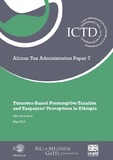| dc.contributor.author | Getachew, Abis | |
| dc.coverage.spatial | Ethiopia | en |
| dc.date.accessioned | 2019-05-10T14:32:17Z | |
| dc.date.available | 2019-05-10T14:32:17Z | |
| dc.date.issued | 2019-05-10 | |
| dc.identifier.citation | Getachew, A. (2019) Turnover-Based Presumptive Taxation and Taxpayers’ Perceptions in Ethiopia, ATAP Working Paper 7, Brighton, IDS | en |
| dc.identifier.isbn | 978-1-78118-556-8 | |
| dc.identifier.uri | https://opendocs.ids.ac.uk/opendocs/handle/20.500.12413/14488 | |
| dc.description.abstract | This paper focuses on the perceptions of a turnover-based presumptive tax system in Ethiopia. It mainly focuses on taxpayers’ perceptions of fairness, simplicity and administrative capacity. In this study, fairness has been assessed based on seven dimensions, namely exchange fairness, procedural fairness, horizontal fairness, vertical fairness, inter-group fairness, time-related fairness and compliance fairness. Exchange fairness refers to the adequacy of the provision of public goods and services to citizens in the long run. Procedural fairness is a measure to assess the representation of taxpayers in the estimation process. Horizontal fairness is a form of fairness that deals with the treatment of taxpayers in similar situations paying similar taxes. Vertical fairness refers to sharing the overall tax burden based on taxpayers’ ability to pay. Time-related fairness means that the total tax liable is suitable over the long term and not overly distorted by fluctuations in income and wealth. Inter-group fairness is the form of fairness that means that no individual group within the system has special treatment. Compliance fairness is a fairness dimension which measures whether all taxpayers in the system pay their tax dues on time. In addition, the study also focuses on design features and challenges encountered in applying the scheme. The paper uses survey data coupled with results of in-depth interviews conducted with selected taxpayers and officials in Addis Ababa. It also highlights the international experiences of presumptive tax designs that Ethiopia can draw lessons from. The findings of the study show that there is a negative perception among taxpayers of five of the seven dimensions of fairness: exchange fairness, procedural fairness, horizontal fairness, time-related fairness and compliance fairness. On the other hand, the findings show that there is a positive perception of two dimensions of fairness: vertical fairness and inter-group fairness. Taxpayers’ perceptions of simplicity and administrative capacity are found to be negative. | en |
| dc.language.iso | en | en |
| dc.publisher | IDS | en |
| dc.relation.ispartofseries | ATAP Working Paper;7 | |
| dc.rights.uri | http://creativecommons.org/licenses/by-nc/4.0/ | en |
| dc.subject | Economic Development | en |
| dc.subject | Finance | en |
| dc.subject | Governance | en |
| dc.title | Turnover-Based Presumptive Taxation and Taxpayers' Perceptions in Ethiopia | en |
| dc.type | Series paper (non-IDS) | en |
| dc.rights.holder | © Institute of Development Studies 2019 | en |
| dc.identifier.team | Governance | en |
| rioxxterms.version | VoR | en |


